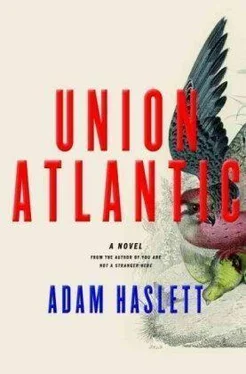Once, when their mother had taken their father off to New York to see a specialist, his sister had thrown a party at the house and a girl had been sick on the front staircase, and though she’d tried her best to clean it, the detergent his sister had used had left a paling stain, which Nate passed over now as he headed up the stairs.
Anywhere people lived memory collected like sediment on the bed of a river, dropping from the flow of time to become fixed in the places time ran over. But in this house, since his father had died, it seemed sediment was all that was left: the banister, the hall mirror, the bathroom’s black-and-white tile, the ticking on the runner carpet that led to the foot of his mother’s door — all of it heavy with his absence.
This was the trouble with staying away with friends and getting high. He felt wrong for forgetting his family even for a few hours, as if to keep faith with his father required an unceasing grief.
Knocking gently on his mother’s door, he turned the handle open. She was reading in bed, the covers pulled up to her waist. She glanced up over her reading glasses, her oval face gaunt, as it had been for months. She’d lost considerable weight in the last year and still ate very little.
“Was that Emily dropping you off?”
“Yeah,” he said. “We saw a movie.” He paused for a moment, feeling the obligation to offer her something more.
“I went to that lady for tutoring.”
“That’s right, I’d forgotten. How was it?”
“She’s a little strange. But it was okay.”
It never stopped being terrible, how alone his mother looked. He couldn’t make it go away, even by being here, even if he were never to leave.
“Sleep well,” she said, looking at him with a tender, somewhat distant expression, as if she hadn’t seen him in a very long time.
By Nate’s third visit, Ms. Graves had stopped discussing American history altogether and thus any topic that might appear on his exam. Jumping off from Wilson at Versailles, she had waded into the diplomatic correspondence that detailed Britain’s haphazard Middle East strategy following the Armistice.
“It came down to a lack of troops. Their army was fading away, you see. Someone had to maintain law and order. And so the British did what empires always do — they installed puppets. The Hashemites! Losers to the Sauds in the battle for the Arabian Peninsula! Why not give them Jordan! Of course it was only supposed to be a temporary fix, six months of police work until the mandate could be rearranged, a gentlemen’s agreement, but look what we got! What should obviously have been the Palestinian state run for eighty years by an imported monarchy. Cancer number one. But why stop there? Ms. Gertrude Bell is a very fine and knowledgeable woman but not quite fit to rule Mesopotamia and given that the French had chucked brother Faisal out of Syria, he was in need of a job, so why not give him Baghdad — another Hashemite installed to rule an incoherent people in an incoherent country! Truck in the Sunni elites! Throw in the Kurds! Can’t you just picture it?” she asked, tossing her arms in the air. “Little Mr. Whatsit in his Whitehall office carefully drawing his map. If it weren’t so lethal it could be read as farce.”
When Nate ventured that the units he’d missed in class were on the Revolutionary War, Ms. Graves closed her eyes, held her palm out like a guard at a crosswalk instructing him to halt, and said, “I can’t do George Washington. I simply can’t. Triumphalist or otherwise. You’ll have to go elsewhere for that.”
Slouched again in the wingback chair, Nate let go of whatever responsibility he’d felt to prepare for the test. What did an AP credit matter when he hadn’t even applied to college? It didn’t compel. Not like the woman in front of him, who was so clearly driven by her own imaginings. It reminded him of the time his father had borrowed someone’s yacht and sailed Nate out to Block Island to visit a businessman he had met on an airplane, a man who owned a paper company and might want to make a deal, only the businessman wasn’t home when they arrived at his waterfront house; the maid said he’d gone to Brazil. And so they sat together on the empty beach sipping the gin his father had brought in a thermos, the liquid warm now and rather bitter.
Thus, while it surprised Nate when Ms. Graves asked at the end of the session if he would like to continue their work over dinner, it seemed to make an odd kind of sense, and he didn’t hesitate to say yes.
At five thirty on a Friday afternoon they were the only customers at Finden Szechwan. A sunken-eyed waiter greeted them and the two dogs with a resigned nod of the head, directing them toward a banquette in the corner.
“At least their prices don’t seem to have changed,” Ms. Graves said, studying the menu through her reading glasses. “But you shouldn’t worry about that. I’ll take care of this. I’m celebrating, you see. I got a letter today about this suit I’ve filed. There’s going to be a hearing soon and it turns out that the case has been assigned to the perfect judge. You noticed, I’m sure, that enormous house next to mine.”
“Yeah. It’s pretty impressive.”
Her head recoiled, as if he’d tossed a rat onto the table.
“Of course,” she said, slowly gaining hold of herself, “there’s no reason you should understand. I forget so easily — the ignorance of the young. How would you know these things? No one’s taught you.” She put down her menu and leant across the table toward him. “In which case, allow me. That house,” she said, her voice dropping, “that house is an abomination!”
“It was just an opinion,” he said.
“No!” she cried. “That’s precisely what it isn’t! That’s precisely what’s become so endemic. That cheap, mindless relativism. You’re all awash in it. Of course it’s a pluralist society. So we’re modest. In the big things: religion, metaphysics. We’re non-absolutists. That’s secularism. That’s maturity. That’s what the zealots can’t abide. But this business of opinions. As if the world had no discernible qualities. As if there were no history. It’s a disaster. It’s an abandonment of the Enlightenment. All in the name of individualism. And they expect people to just stand by and watch. I was run out of my job on this sort of hogwash. The whole four-hundred-year effort sacrificed on the altar of the inoffensive. It’s unspeakable.”
“Right,” Nate said, afraid of the woman for the first time.
“But that’s just it!” she exclaimed, thrusting her hands out to her side, knocking Sam in the face. “You’re agreeing with me because you think that’s what I want. That’s the problem. Do you think I was the one who brought The Autobiography of Malcolm X into the classroom? No. That’s what they forget. It was students , black students God forbid, bused out from the city, who told me they’d stop coming to class if I didn’t assign it as a counterpoint to King and the nonviolent wing of the movement. And more power to them. They were right. But by the time the authorities got rid of me those children were swallowing that book down like just one more palliative drop of minor guilt and minor catharsis, one more petty event in their two-bit little moral Olympiad, where everyone always wins gold. The young limbs of the body politic cleansing themselves for future efficiency. I played them the tapes of his speeches, and even met them halfway by showing the damn movie. But it was all just one big entertainment to them.”
The waiter had come over to take their order but in her enthusiasm Ms. Graves failed to notice him.
“However, I digress. The point is, that house, you mark my words, it’ll be gone. This town, those selectmen — they broke the law.”
Читать дальше












